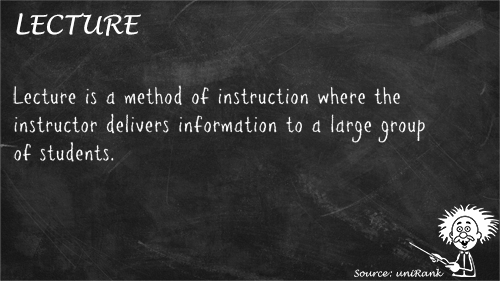
Lecture
What does the academic term Lecture mean in higher education?
Lecture

Short Definition
Lecture is a method of instruction where the instructor delivers information to a large group of students.
In-depth Overview
Lecture
Long definition: A lecture is a formal educational presentation or talk delivered by an expert, typically an instructor or professor, to a group of students or learners. Lectures are a common method of teaching in higher education and are used to convey information, explain complex concepts, provide insights and facilitate learning in various academic disciplines. They are often part of a structured curriculum and serve as a means of transferring knowledge from the instructor to the students.
Etymology: The word "lecture" originates from the Latin word "lectura", which means "a reading" or "that which is read". In ancient times, lectures were often associated with the reading of texts or manuscripts.
Synonyms or related academic terms: Presentation, Talk, Seminar, Address, Discourse.
Examples of Use:
- The professor delivered a captivating lecture on the history of ancient civilizations.
- Students are required to attend weekly lectures as part of their course requirements.
- The guest lecturer discussed cutting-edge research in the field of artificial intelligence.
Translations:
Spanish: Conferencia
French: Cours Magistral
German: Vorlesung
Italian: Lezione
Portuguese: Palestra
Japanese: 講義 (Kōgi)
Chinese (Simplified): 讲座 (Jiǎngzuò)
Hindi: व्याख्यान (Vyākhyān)
Visitors can search for this term through the uniRank World Universities Search Engine.
Wikipedia Article
unirank Glossary Classification
Miscellaneous higher education terms > University academic terms